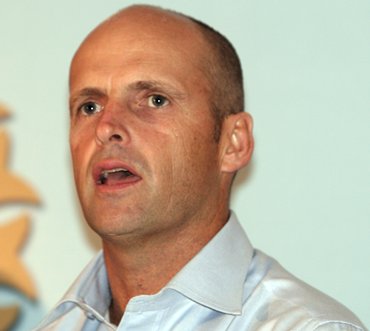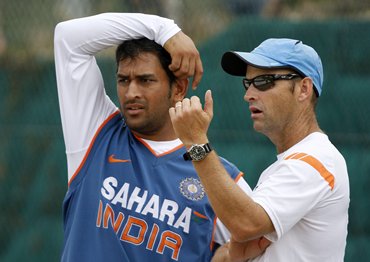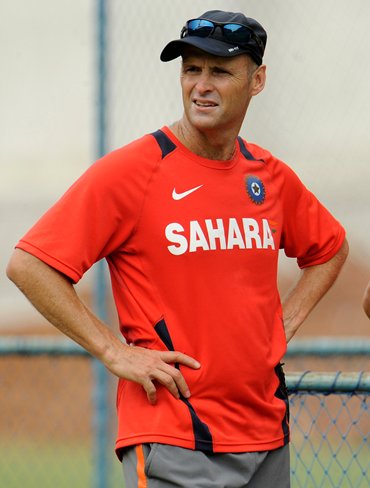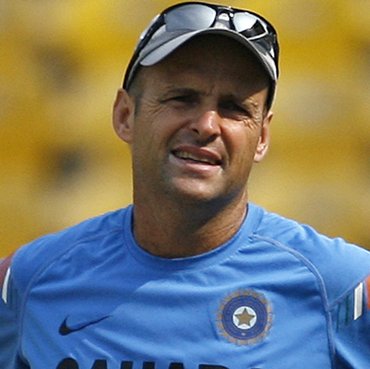 | « Back to article | Print this article |
Former India coach Gary Kirsten bats for DRS
Cricket's controversial Decision Review System (DRS) has received the backing of World Cup-winning coach Gary Kirsten, who also believes the associate members' bid for direct entry into future tournaments would be good for the sport.
- 'Twenty20 cricket will dilute Tests, ODIs'
Kirsten, who led India to 50-over World Cup success in April, told Reuters in a recent interview that DRS had helped improve the game, though his former employers are not in favour of it.
DRS allows teams to question two umpiring decisions per innings, and a third umpire uses the available technology, including hawkeye which replicates the ball movement, to determine if the on-field officials were correct.
'I am very much in favour of it; it's a great system'
"Personally, I am very much in favour of it; I think it's a great system," the soft-spoken South African said, in a hotel overlooking Singapore's Marina Bay.
- 'What's India's problem with DRS?'
"I think what it has done .... is that it has increased the consistency of umpiring so I am a fan of it but I know there are some negative views of it within India."
The Indian cricket board (BCCI) has been strongly against the mandatory use of the DRS system, voicing concerns about the technology's accuracy despite the International Cricket Council (ICC) saying it had improved correct decisions by seven percent.
'There can be a few adjustments'
The former South African opening batsman did, however, think the technology could be adapted and teams could still be prevented from using the DRS break for strategising.
"There can be a few adjustments; I know one thing that was discussed at the (ICC) cricket committee (meeting in March) was that they might bring down two appeals per inning to one appeal so that it takes away the strategy around using DRS.
- Indian cricket healthy, but seam bowling a concern
"The tool is there to improve umpiring so it takes away the players using it as a strategic tool. I know that is being floated but I don't know if that has been passed yet."
'Great that all teams are involved in the WC'
Kirsten also said it is important that smaller nations outside the top 10, known as associate members, are given help and automatic entrance into future 50-over World Cups as they offered some variety.
The ICC initially restricted the 2015 World Cup, to be held in Australia and New Zealand, to the 10 Test-playing member nations only to backtrack and propose a qualifying tournament for minor nations like Ireland, who recorded memorable victories over England and Pakistan in the past two editions.
- Time under Chappell worst of my career: Zaheer
"That's what World Cups are about," Kirsten, who was speaking on the sidelines of the Nomura Asia Equity Forum, said of the inclusion of the non-Test playing nations.
"We play enough series against the great teams out there, World Cups are about an indication and illustration of how we are spreading the game to all corners of the globe, which is one of the mission statements I think of the ICC. So it is great that these teams are involved in an event like that.
"Someone like Ireland, as we know is probably the talking point, they have had tremendous success in their limited professional structures they have in place and they could really, for me, be an example to other associate countries that this is how you do it."
Kirsten less open to idea of day-night Tests
However, Kirsten was less open to the idea of day-night Test matches, which some believe will help make the format more commercially attractive.
"Is Test cricket in trouble?" he asked.
- Bowling will determine India's Test future: Dravid
"The last four Test series that I have watched around the world have shown it is still a great product. We must be careful in my view not to tamper with something that is working really well.
"To be honest with you I would love to see Test cricket being played through the day as I think that is what it stands for."

© Copyright 2025 Reuters Limited. All rights reserved. Republication or redistribution of Reuters content, including by framing or similar means, is expressly prohibited without the prior written consent of Reuters. Reuters shall not be liable for any errors or delays in the content, or for any actions taken in reliance thereon.




